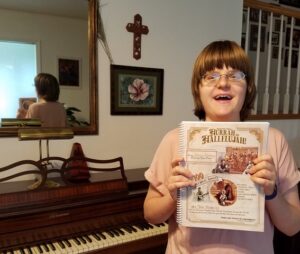Whenever those of us in education think of young children, we consider the multitude of possibilities for influence in every arena of their lives. So when asked to contribute a guest article for my friend Carol, I asked my daughter Michelle, “Where would you start?” I clarified, “Where would you begin to introduce children to the arts?” After a few moments of discussion, we realized this topic would be too broad for a single article. We narrowed to one of her loves: opera.
She and I reflected together. She ran up to her room to gather books to recommend. We recalled the first operas she and I attended. We laughed at silly memories from some and we quieted with humble poignancy at others.
Michelle is 26, though like many people with special needs she looks much younger. Michelle has a host of diagnoses on paper, but in her heart she has a love of opera. She was delighted to help me share.
We settled on “Starting Small” as our title. After all, not many of us will one day lead exhilarating tours across marvelous lands like Carol has done! We all might, however, aspire to join her in those journeys through webinars, courses, or – best of all – in person. My motto in our family’s pursuit of classical education has been this: One need not be great to aspire to greatness. Mercifully, with a little help, most of us can dip a toe into the waters of greatness with our children or grandchildren. We just need to start small.
Ironically this approach is inspired by Carol’s own talks. One of my favorite things about Carol is her ability to explain the greatest things in a way that inspires us to appreciate the smallest steps. Carol can deliver a vivid, impassioned discourse about the intricacies of dance in mysterious cultures. Then she will tell us quickly and with the same fervor to start an appreciation for dance by taking the hands of our little child and dance a spontaneous jig in our own kitchen!
With Carol’s joie de vivre as our inspiration, my daughter and I invite all who know the humbling necessity of starting small.
Words and Music
Where do we begin? We begin by sharing a love of words and a love of music. Read A Child’s Garden of Verses by Robert Louis Stevenson. Play A Child’s Garden of Songs by Ted Jacobs at the child’s rest time, play time, or bedtime. Sing nursery rhymes and clap along to folk songs. Gather with others to sing carols and hymns.  All of these can be found in Professor Carol’s songbook Hurrah and Hallelujah!, which we love so much that my daughter and I recently created lesson plans by level of difficulty. In this way families and classrooms can start small.
All of these can be found in Professor Carol’s songbook Hurrah and Hallelujah!, which we love so much that my daughter and I recently created lesson plans by level of difficulty. In this way families and classrooms can start small.
Before we ever bring a child to the opera, we want to fascinate and delight the child with words. We can play word games, such as I Spy or cumulative ABC lists of things we will bring on a trip. We can read stories with increasingly complex language just slightly above the child’s own vocabulary. After the child learns to read, we can continue reading to him to stretch his language and his attention span for listening.
When he reads reasonably well, we can introduce Latin and grammar. We love Memoria Press’s Prima Latina as an all-in-one course to teach delight in words, simple Latin vocabulary, and English grammar. We can begin at the age or ability of 8 to introduce Latin for a fascinating and harmonious way in which words express meaning among us.
Delight with words can be accomplished with humor or in a lighthearted manner. We can tell jokes, encourage puns and plays on words, solve child-friendly word searches or crosswords together.
We can keep seasonal books, just as we do decorations. For example, when we gather Christmas music or decorations to bring out annually, we can have a bin of Christmas storybooks for all ages to share.
Words and music can become part of celebrations and daily life. Writing notes to the child, playing or singing favorite songs, keeping written memories in scrapbooks, and reading those stories to the child may help to cultivate a sense of delight with words.
The Performance
When children begin to delight in language and are ready to sit for a performance, find an opera designed for children. At my daughter’s suggestion, her twin brother’s first opera, Menotti’s Amahl & the Night Visitor, captivated him in ways that surprised him greatly!
If you cannot find an opera performed for children, you might begin with a humorous opera sung in English. Gilbert & Sullivan’s Pirates of Penzance came recommended to my daughter as her first full-length opera. The plot itself is a play on words: Specifically, a governess receives ardent instructions to train her promising male charge to become a pilot. She thought they said, “pirate.” Great silliness ensues.
Another way to start small is to seek performances that retell familiar stories. Such operas bring joy to child and adult alike, even if sung in another language. English super-titles assist understanding, as do familiarity with the characters, setting, and story. For example, Michelle and I attended a young opera company’s performance of Hänsel und Gretel. This is now in her top three operas of all time even though, as Michelle told everyone later, “The only German in all of Hänsel und Gretel I knew was und!”
She and I also enjoyed Cenerentola, the poignant tale of Cinderella so full of pathos that I wept. Although retellings abound of this classic story, the operatic version crafted by Rossini remains my favorite.
Tickets to children’s operas, matinee student performances, or smaller companies’ productions make wonderful gifts to children whose closets already bulge with tangible items. My daughter and I have found that our lives are richer for the time spent together accumulating these shared experiences. Together we have seen and enjoyed seven operas so far over ten years.
On Michelle’s 16th birthday, at the suggestion of a friend who is a devotee of opera, we gave Michelle a now dog-eared book she recommends highly as a starting point. Written by Henry W. Simon, her now dog-eared copy of 100 Great Operas and Their Stories: Act-by-Act Synopses has become a beloved possession. For a next step she recommends the more comprehensive Milton Cross’ Complete Stories of the Great Operas. Her copies are 1989 (Anchor Books) and 1952 (Doubleday) respectively. You may find newer editions.
Introducing ourselves to operas as intriguing stories set to music has won us over. And it all began by starting small. In future articles, we may address ballet, art, and theater.
Cheryl Swope is the author of Simply Classical: A Beautiful Education for Any Child and creator of the Simply Classical Curriculum (Memoria Press) for children with autism, adhd, Down syndrome, and learning disabilities. Cheryl and her family live in a quiet lake community in southeast Missouri. SimplyClassical.com.




